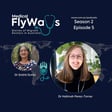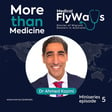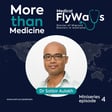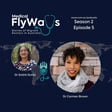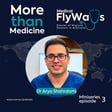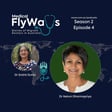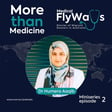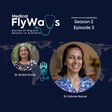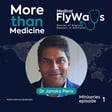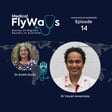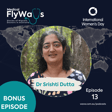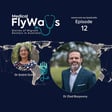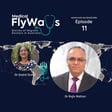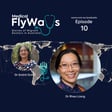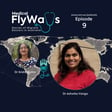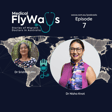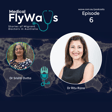Become a Creator today!Start creating today - Share your story with the world!
Start for free
00:00:00
00:00:01

Series 1 Episode 2: Dr Talat Uppal
Obstetrician and Gynaecologist Dr Talat Uppal joins Dr Srishti to share her experience as an internationally trained doctor, from growing up in Africa to running an integrated women's health clinic in northern Sydney. Dr Talat shares her frustrations and hopes around supporting international medical graduates navigate the muddy waters to practice medicine in Australia.
Know a doctor whose story needs to be heard? Email info@wave.com.au to put us in touch.
Recommended
Transcript
Introduction and Guest Background
00:00:01
Speaker
Medical Flyways, the untold journeys of migrant doctors in Australia.
Journey to Australia and Medical Passion
00:00:13
Speaker
Hello Talat and welcome to the podcast. I have read and heard a lot about you, but I would appreciate if you can bring yourself to the podcast and introduce and tell our guests about yourself, please. Thank you so much, Srishti. It's such a joy to be on this podcast and what an amazing innovation and initiative it is.
00:00:34
Speaker
So my background is that I grew up in Africa and I did my medical degree there, my MBBS based foundational degree. And then I migrated to Australia after having done one year of internship overseas.
Career and Family Challenges
00:00:52
Speaker
And during my medical degree, when I started obstetrics and gynecology, I kind of knew, you know how sometimes you just have a feeling that that's the reason you've been put on the planet.
00:01:04
Speaker
I did feel that I worked in a base hospital in Nigeria and basically it allowed me to see such a variety of conditions but also a lot of suffering in women's health that I think gave me a purpose to pursue that line.
00:01:23
Speaker
And even those, Rishti, I would not say it's always easy and there have been times, especially with rosters during the training where you think, ah, I must have had rocks in my head. But like, I don't think I've ever truly looked back and regretted that decision. I feel that it's only with the passage of time being a space where I feel even more and more, oh, thank goodness I chose this. This is so much, you know, so much to do here, so little time. So that's a little bit of my background as to where I started.
00:01:51
Speaker
When I came to Australia, I had to do the AMC exams, which after completion, then I did my internship again in Australia, which was the, at that point, the scenario for IMGs. And then I went directly into an SRMO position. And in those times, I'm beginning to sound like a dinosaur now. In those times, we actually didn't have a very structured centralized intake for training positions for obstetrics and gynecology.
00:02:19
Speaker
So I basically went in, I had three pregnancies, each with hyperemesis and not without its own dramas on the way. And then when I completed my training, I decided that I wanted to go into staff specialist position, partly because I
00:02:37
Speaker
do enjoy community background or like thinking more bigger picture than just the woman in the room in front of you. And also because at a personal level, I had a child with who had been diagnosed with autism.
Transition to Private Practice
00:02:51
Speaker
And I think I would be probably very typical of many, many doctors where we are trying to combine our professional and our personal lives and trying to sometimes
00:03:03
Speaker
You know, just see how we can find that Goldilocks spot, which is always changing as well, if I might say with you as life evolves. So anyway, so I select I basically accepted staff specialist position. I enjoy management or administration and I think part of it is.
00:03:21
Speaker
that I don't like, I love clinical work, but not just clinical work. If I can put it that way, I do enjoy variety and medicine often does not offer you that. Sometimes you actually have to create that sort of a balance between what you feel is a perfect fit of different, almost slices of the pie, especially if I can put it like that. So anyway, I did a staff specialist position and recently, listen, I would say about five years now if I'm doing the maths right.
00:03:49
Speaker
I then ventured into private practice. The reason for that was that we had a shiny new hospital at our doorsteps that logistically made it a no-brainer, but also my children were older. I was in a midlife phase. I felt like a new adventure. That was how I ventured into the private space. Ever since I think I was a senior registrar, I realized that
00:04:17
Speaker
It is good to have an educational niche as well. And I thought, you know, when I was in those formative years, I was thinking, oh, do I embrace like mid-week free teaching or something that interested me? Or I thought, how about investing in registrars in ONG side
Collaborative Efforts in Women's Health
00:04:32
Speaker
of things? Or what about then I looked at the GP specialists and registrars and I thought, you know what? This is a space where I wasn't aware of so many gynecologists that said, look, this is my
00:04:45
Speaker
primary interest when it comes to supporting education and supporting learning. And so very early I made that decision and I actually genuinely did not have any commercial interest. I was in a registrar position. I remained in a staff specialist position for 10 years. So I think it was a really authentic. I wasn't even necessarily planning any private practice. I'll touch on that later in the interview, how the cards fell.
00:05:10
Speaker
for me. So I feel that that was my very authentic passion to say, you know what, this is a portfolio that interests me. And if you really break down women's health, the actual heavy lifting of gynecological or women's health concerns is actually done at the core phase with GPs. And so how can we improve and optimize and work together as colleagues to be able to achieve the best for the community was what was in my mind.
00:05:40
Speaker
And so therefore seriously, my pattern of professional educational side was from the primary health network, supporting them with their educational sessions and with their programs. And then at a college level with Dranskog, I was lucky to be in charge of the, I was a coordinator for the advanced Dranskog program.
00:05:58
Speaker
in which we supported GP obstetricians in the rural Australia. Honestly, I learned so much from that portfolio. And then basically when I did my own private practice, there was no doubt that I was going to bring this in. And so I then chose to accredit our practice with RACGP because I wanted to understand more about standards and understand how we could not just, you know, a token exercise of including a GP, but actually say, Hey, we're trying to create
00:06:26
Speaker
a place or a medical center where you're a very valued member of my team.
Vision for Inclusive Healthcare
00:06:31
Speaker
Correct me if I'm wrong, but I believe I'm the only gynecologist that has voluntarily embarked on that mission. There are lots of medical centers obviously that invite Guinee into the sessions or the other way around. I think there's more and more understanding that actually a team is not complete, a multidisciplinary team is not complete without GP representation.
00:06:54
Speaker
So there are a number of my colleagues that are now, or even prior to me in Tasmania, one of my mentors and friends had a similar model, but I guess I just structured it more than your everyday gynecologist.
00:07:09
Speaker
Yes, no, I'm certainly not aware of another private gynecology clinic that does it and champions it as you are doing. It was, Rishti, a year of my life. I'm not going to get back. I don't know if I should say this, but there were times our friends were like, why are we doing this? And I said, no, no, no, we're now halfway through. We're going to complete it because we're doing it because it's part of our roadmap and it's part of our purpose. And yeah.
00:07:36
Speaker
Yeah, and for the benefit of the listeners, this is Women's Health Road in New South Wales and Sydney. And there's opportunities for, it's truly a multidisciplinary integrated care model that you're trying to establish in the community. So the idea of that being, that the interest that you have and developed over a period of time kind of coming together as well sounds very fascinating. Thank you, Sreshti.
00:08:04
Speaker
Now I know that I read, again, for the listeners, there's this very interesting article that you've written, which is yourself and two other obstetrician and gynecology colleagues that speak about their IMG experience.
00:08:19
Speaker
It's a recent one, although when you click on it, it says three years old. The S.I.M.G. Journey, Personal Experiences in ONG Magazine. And I must admit when I read this, there was so much that I could relate to that I was quite surprised that the two of us who have never met each other and have had slightly different early life experiences have still had similar Australian experiences in some ways.
00:08:45
Speaker
But one of the things I didn't find in here, which I think you've referred to, but I'd like you to tell us a bit more about, was why did you choose Australia?
Cultural Diversity in Patient Care
00:08:54
Speaker
Because you describe yourself as a global citizen. Yes. I always make the jokes, Rishti, to say that I speak a number of languages and a bit of English. So when I was training, because obviously I spoke a few. I grew up in Nigeria also. By birth, I'm from Pakistan and Hindi and Urdu.
00:09:12
Speaker
similar Punjabi and you know so you you kind of almost become fluent at all of those and so yeah so then forever I was like saying to the interpreter look I'm fine this is fine and then I noticed the interpreters sometimes were getting upset because they had been rostered the public clinic was so busy they didn't know who was going to be the registrar what your like multilingual abilities would be so a few times seriously then I said okay I then didn't declare that I could understand the language and then I wouldn't
00:09:39
Speaker
occasionally have the interpreter, you know, adding things to what I said, like, oh, she thought she said this, but you know, you got my sister has had this, and I'm thinking, no, no, no, don't say that. So it does give you some few powers, I think, in that context being multilingual.
00:09:56
Speaker
Now you're living in a part of Australia which I think is fairly multicultural and fairly diverse. And you've touched on more than one thing in what you've shared there about many of us that come to Australia, of course, have in our own way lived.
00:10:13
Speaker
As you said if you live in south asia without actually being aware of it from a from a racial diversity point of view there is diversity in many other forms in language and culture and you know food and ways of living quite a bit so it actually took me a while to understand that i had experience diversity already
00:10:34
Speaker
And then you come to a largely, well, I did, but not yourself. But when you're in Sydney, do you see that ability, you know, that superpower of multiple languages, understanding of multiple cultures, almost being able to very quickly put people from a different cultural linguistic or racial or ethnic background at ease with yourself, actually valued in your work or
00:11:01
Speaker
Yes, Trishti, I do believe that, and I think part of it is the mindset of the clinician. I don't make any apologies for who I am, and I'm actually very proud of the fact that we combine a number of cultures and strengths from each one. I guess, for example, I also work at a public hospital, Hornsby Hospital, which is my local hospital for New South Wales Health One. That does service a great population of
00:11:30
Speaker
continent women. And the context of going in sometimes at 1am to support the registrar, to see a woman you have not seen in the past in pregnancy, you know, if you've been called in, it's either a workload issue or a complexity issue. And sometimes Shrishti, I just walk through the door and I say hi. And then I recognize that, you know, from the card or from that, that they can speak and I say something in Hindi or in Urdu. And
00:11:56
Speaker
Honestly, the relief, I can't articulate the moment that that occurs. And there's this de-escalation immediately of saying, oh, wow, yes. And then we start a conversation. It is so powerful, even though that is a time where especially someone might feel very vulnerable, or I wouldn't say I would have had the longitudinal care advantage
00:12:21
Speaker
It is just so palpable that women do connect with that multicultural or that ethnic sort of connection. I think that I feel that it's something that I look at something that I can support someone as an extra, almost like an icing on a cake or the cherry on the icing on the cake. We are here for everybody and obviously every single patient is important, but sometimes you're able to provide extra leverage because of that.
00:12:48
Speaker
And you and I know, Srishti, that the journey of women is not just physical, there's also psychological, and it's also an actual outcome and experience. So there are, I think, a number of spaces that you tap into when you have that advantage.
00:13:02
Speaker
I think you've highlighted something that is going to be a more relevant experience from other parts of Australia as well. I was looking at Brisbane statistics and it says the population increase is significant and the majority of the increase is migrants from other parts of the world. Absolutely. Absolutely. The trajectories are that it would be best if our health system
00:13:27
Speaker
you know, was at the forefront of this, you know, changing numbers as if you would have read our recent census projections and that we prepared actively to welcome and embrace all patients, you know, and identified what the barriers were and work with clinicians. So Shrushti, for example, we are creating a number of multicultural, we're involved in a number of multicultural exercises, still at the very much
Gender Equity in Medical Leadership
00:13:52
Speaker
infancy of those. But for example, I noticed that
00:13:56
Speaker
let's say there's a topic, let's just take any topic for example, and then you have them translated into different languages and that to me is less appealing. To me an authentic, like for example, my little obsession is abnormal bleeding. If I was to make a resource, for example, yesterday I attended an Indonesian ceremony I was invited to, I basically said, I would like to see an Indonesian patient in that team, I would like to see an Indonesian GP,
00:14:24
Speaker
I would like to see, and I would see my role as mostly just facilitating something, but actually we need it to be a grassroots resource for it to make the most impact. What do you think?
00:14:38
Speaker
I'm intrigued by that in the sense that I think there's this little sociology research that I've done a bit of a deep dive and like if you look at it from the other perspective when doctors from other migrant doctors and in Australia it's a very broad brush come
00:14:54
Speaker
over and particularly like speaking to the cohort that you mentioned of and I'm more familiar with JP is less so with hospital trainees in your you know you're parachuted into an environment which you're probably a little unfamiliar with you've described that in the article as well for your experience
00:15:11
Speaker
There's an expectation of cultural training and understanding that is a little bit unidirectional in that sense. And by and large, I think if we acknowledge the diversity, we will start to make it a more bidirectional process. What you see as a vision is the patient is empowered enough to be able to access that information in a
00:15:37
Speaker
a relatable culturally appropriate context as opposed to purely a linguistic translation. Or someone speaking to them that has been interpreted as opposed to from within the community. And it's fascinating you say that because one of the other things I was going to ask you about was your involvement with the gender equity and diversity working group.
00:16:02
Speaker
and your experience of what you think might have changed from the perspective of those who are coming in now as compared to people like yourself and me who have put a few decades behind us. What do you think, what can they expect or what's different for them? Yeah, so I thriftly do find that I'm cautiously optimistic
00:16:27
Speaker
I know that obviously there's a huge gender gap still when we look globally and we look at the bigger disadvantage that women face. And myself being a woman of color, I also always want to acknowledge my privilege. I was born into an educated household. I didn't have many barriers that so many women have to battle. But I guess the point I was trying to make is that we are starting to see more
00:16:54
Speaker
women and whether this is a combination of the pipeline effect and more diversity in general. This is not just about a gender. This is a much bigger, I think, philosophy around just having the leadership represent the situation on the ground. And so we don't want leadership to be
00:17:15
Speaker
just one type of people, if I can put it that way. And I do think that that culture is changing. And again, I would say I'm a little bit of a goldfish in a bowl. So I would say, certainly from an O&G college point of view, I have felt I did want to be an active part of that. Because of some bandwidth issues, I had to resign from that board after a few years. But I really enjoyed my time as part of that. I can't tell you how many people have said to me, oh, that's just a token exercise.
00:17:44
Speaker
I would say, yeah, okay, fine. One, I don't truly believe it is, but let's say even hypothetically, okay, fine, it's a token exercise. Have you had that before? I remember in 1998, there was no one even talking about it. There is still progress, even if it may not be the ideal way that we want to see in the longer term. I think the conversation has started. Swishti, for me, it was so common to go into rooms where
00:18:13
Speaker
no one looked like me. I have been very lucky to have some really good male mentors as well. Obviously, there were only men mostly that we were working with in that capacity that were older than you. But I would like to acknowledge all the positive support that I've also accessed. But there is a magic in
00:18:33
Speaker
seeing someone that you think, oh, actually, you know, this is what who I want to be. And that person is there. And because I do a bit of media, believe me, I've been in situations where
00:18:44
Speaker
You know how they touch you up before you go in and they go, oh, we don't have any makeup in that color. And then as a reflection, the person said to me, just very honestly, not in a bad way or in a way to make it look. It's a matter of fact thing. It's just a matter of fact. She said, oh, we've never had. We've had brown men. We've had this, but we've just never had a brown. And I'm saying, well, go buy that then because there will be more of them coming after me.
00:19:10
Speaker
on first-hand experience that the whole box didn't have any shade that matched me. These are our first-hand experiences. For example, I think if our grandmothers hadn't gone into those phases, we might still not be voting. I think this is the duty of care of our generation, both men and women, and all sorts of diversity.
00:19:36
Speaker
to be a bit more embracing and to look around the room and say, look, if that's a panel, how can we make it more diverse? How can we make, yes, and the audience that's going to listen to it, how do we make it relatable to them and not just only a clone of a certain type of person?
00:19:54
Speaker
Absolutely and you know more power to you and in every aspect as you've done it and I do think I want to highlight what you've said that progress and incremental change is valuable even if that is not radical change and sometimes it takes an effort. Yes my grandmother was one of very few women who went to university
00:20:16
Speaker
So, I think it would be hard for her to imagine the world looks like a different place in some of which she approves and some she doesn't. So, let's... The trust is in the minuses. Yes, absolutely. And yeah, I guess I was just going to ask you one other thing. As a person who sounds like you've advocated for yourself in all of this as well as for others, is there any tip you have for anyone who is not yet in those spaces
00:20:44
Speaker
And irrespective of what we consider, whether it's private practice, whether it's education, anything new that they haven't tried or they haven't been invited to. That's the other thing is, as you said, you have to create it for yourself. What's the first step in that journey? What's the first thing you need to? And I don't know whether we are a product of our experiences or obviously you are born with certain type of DNA. I don't know what it is. Personality and skills and...
00:21:13
Speaker
I'm going to say that I genuinely don't have a lot of imposter syndrome. So when people say they have this, I listen and I think I wonder what that is. So I have not undervalued my talent myself, but I also am very self-aware that, look, these are my limitations. I have no hesitation. For example, when I was starting the model, Srishti, a number of people said to me,
00:21:38
Speaker
or you're starting a multidisciplinary model, then there's going to be someone obviously more talented than you surgically in that space who have chosen to go into, for example, robotic surgery, or for example, subspecialty of urogynecology, for example. And so what? I'm going to say to the patient that this is the combination of care that I suggest is a good plan for you.
00:22:01
Speaker
And I'm going to be very honest about what my abilities are and where someone else, one of the clinicians in our team, is better than me at a particular skill. I feel that's a very matter of fact. And interestingly, Srishti, apart from obviously a very small minority of women, most patients have appreciated that honesty. And I haven't felt any shame in saying that.
00:22:27
Speaker
But the point I was trying to make is that if you don't value your own talent and all of us have different talents, some of us may be good communicators, some of us may be better at various surgical skills, others might be better at scanning or better in general practice also. I've seen how there's so many special interest areas as well in addition to the base of general practice. So I think it is good to have that, to pat yourself
00:22:56
Speaker
rather than and this is what I try to train my children if they have a bad day or if they I'm like look there's much more to life than beyond that and success is a mindset it's not one day where you get a bad mark or one day you have to learn from that and keep moving forward so my tip would be that you know and and I we have this hashtag in our practice that I've made a board of which is called make your own door
00:23:21
Speaker
because sometimes through the doors don't open for us and they don't open for us. And I don't want to smash them down. They still don't open. And then you think, you know what? I am going to make my own door.
Innovations in Menstrual Health
00:23:34
Speaker
And that is exactly what I've done in the practice. In the end, I have ended up with a practice where we are doing research. We are now an eligible MRFF funding capable organization. We are also, like I said, inclusive of our GP and primary care.
00:23:51
Speaker
It is basically a space where we are trying to say for abnormal bleeding, what we're doing is genuinely quite strategic in the advocacy space. And we have launched the Australia's first abnormal, you try and bleeding hub. So which means if you walk through our doors, basically, you know, we are, we have capability to see you to, if you need it, for example, ultrasound to do that. If you need an endometrial biopsy, which is suitable as an outpatient, we can do that.
00:24:18
Speaker
We can put in the myrena or an olivinogestrel IOD if that's what you choose. If you need a high-end surgical option, we can facilitate that. If you need a coposcopy, if you need an iron infusion. And thanks to the GP support, if we need any, I shouldn't put it like this, but we're not always very clever above the belly button when it comes to women's health. And so there's so many times I have learned so much from physio, from the GP, from the practice nurse,
00:24:48
Speaker
that I think that the future of care is so collaborative. So I'm sorry, I rambled a bit from the original. No, no, absolutely. And I think that what you're saying sounds, in a sense, what I'm hearing is that collaboration is something that there's a level of self-awareness and a level of recognition of what you bring, what is your unique talent and your contribution that you bring.
00:25:14
Speaker
that no one else can. And it doesn't matter how many degrees you have. Each one of us has the potential to be able to bring something. And that's the bedrock of almost all collaborative approaches is recognizing what someone else brings as well as knowing what you bring to the table. Exactly. And that your talent shouldn't be minimized because the system doesn't always value it at different points in your life. And that you, I think it's easy to say, but
00:25:43
Speaker
I think that's one thing that no matter how difficult a day has been, I still don't think that, yes, learning might be, there might be things to learn, but I don't think that I've ever felt like doubted that part of myself. If I might say it, I always feel a bit uncomfortable saying it.
00:26:03
Speaker
I think because so many people, so many women write that they had imposter syndrome. They feel this is that I'm thinking, no, no, I don't usually have that. I usually think, yeah, yeah. In fact, it's the reverse. I was like, sometimes like, okay, why was that person given that project? I could have done that project.
00:26:19
Speaker
And I suspect you could have. I doubt there was anything there that would have been in. So I absolutely agree with you. I think there's a really lovely DEI advocate. The Americans have gone a bit further than us. So they are questioning some of the principles we utilize now. But we still need them. She's got a speech at one of the American universities where she talks about imposter phenomena and not imposter syndrome.
00:26:48
Speaker
I haven't worked that, no, okay. Oh, send it to you. I think her name's Resh Massajani. It's quite fascinating. She draws an analogy to the fact that cycling was kind of cycling with your legs on either side of the seat was a thing that women didn't do for a long time. And it was entirely based on this premise that it was not acceptable in some way. And so she challenges the fact that imposter phenomena exists
00:27:18
Speaker
Wow! Yeah, and it very much is what you're saying. She says we have provided or coined a phrase which allows women to minimize their contributions and their input. Absolutely. Or not be seen as well as they should be.
00:27:35
Speaker
Absolutely. So this is, in her view, an enabling of the lack of recognition of women's contributions and the lack of opportunity that comes with gender diversity. And I found it refreshing. I was like, I think this is useful to know because as opposed to a syndrome, she says, let's call it a phenomenon. It has less weight that way.
00:28:00
Speaker
Very interesting. So yes, I do think that I'm cautiously optimistic about the future for our people that come behind us. And I feel that for me personally, Sushti, I've seen a lot of value in digital health. I think I would not claim to be an IT expert by any means, but the reality is that this is the future. And the more we embrace digital technology as a foundation on which we rest the clinical decision making and the interaction with the patient,
00:28:28
Speaker
I personally have found a lot of gains in our practice from going down that pathway. What we're trying to do, Swishti, is to design a tool for women. The reason for that is because there are a quarter of women that suffer from heavy bleeding.
Digital Health and Remote Care
00:28:43
Speaker
This is such an undertreated and underrecognized space. It just shocks me every single day. Obviously, because that's my interest, I'm referred to women with this issue.
00:28:52
Speaker
Literally, I'm sitting down and I'm asking, when did it start? Oh, since my last child. Okay, how old is your last child? Your child's child is nine years old. Have you been putting up with this for nine years? Yes, I thought it would go. There's a layer of normalization of period issues by women, we know. Then we have excellent GPs, but unfortunately, there are some GPs who are either time poor
00:29:16
Speaker
or they have not asked and so the woman hasn't volunteered and how to- Or felt comfortable to volunteer. Yeah, how do you ask when you're seeing three things and the woman's probably coming with a toddler and with other issues. So it's not at all that I'm judging, but I'm saying the reality in my practice is that I am getting women who have been through various parts of the health system, Srishti, and they may have had a bit of progesterone, a bit of this, a bit of that, hasn't actually changed their condition significantly enough,
00:29:46
Speaker
to report improvement. And so they're coming to me a single number of ferretins. Are you tired? I'm always tired. Okay. Why are you always tired? So then, you know, like it does make me feel like as a medical community, we have to do better. So that was why it wasn't that I wanted to do research or I wanted to do a digital, you know, embrace that journey, but I felt it's almost like a duty I had to work with
00:30:14
Speaker
other clinicians and the community, particularly the women themselves with the lived experiences. So we're really finding that space of fulfilling because, firstly, at the end of the day, by the time you give iron, if it's bad enough to need that, and you may be, for example, they might tranexamic acid and marina or
00:30:31
Speaker
or have an endometrial ablation, or whatever option they opt for. Often we see very significant before and after, and so then they're feeling, oh, this is fine. I don't feel far less tired. I'm enjoying my life. I'm not worrying about, you know, staying home on the two days that I used to and the hygiene issues. And we know that there's so many angles and it leads to so much mental health morbidity as well.
00:30:56
Speaker
I think that the productivity issue hasn't yet been studied in the depth that it should have. You and I know how many girls stay home from school or they're curled up because they're not going swimming on the periods because it's so heavy. And I think pain has gotten recognition and it's not a competition. I'm really happy that endometriosis has gotten traction.
00:31:18
Speaker
But what I'm trying to do is more focus on a symptom because women at home may not know if they've got a fibroid or they've got an end or they've got this or that. And they may have a combination or have no pathology, but still be bleeding like a tap. So that is my area of interest that I'm hoping that we can set up an international heavy menstrual bleeding day.
00:31:39
Speaker
and things that are three in the thousands which they have a day, and this that affects a quarter of women. Let that sink in. A quarter of women. This doesn't have a day. I think menstrual health and the recognition of menstrual health across the world, even in India, for example.
00:31:56
Speaker
It has 50% or more of your population as women. Even in a society that values productivity, it has a huge impact, as you say, on metrics we can count, like your contribution to the national GDP. Absolutely, absolutely.
00:32:13
Speaker
And I just think that, look, if the quality of life of the women is not important enough at a senior, at a strategic level, then maybe the productivity angle might trigger some funding, some national plans, some, you know, some recognition, some research, even to embrace and embark on research. It's such an uphill space because as a clinician, I'm not necessarily a seasoned researcher and it's a space I'm learning in.
00:32:39
Speaker
But then if you feel that the grants are constantly going to people who are already in that space, but then how do you get into that space if you can get your first grant? It's that cart and horse thing is what happens first. But I think you've certainly set the tone for it, particularly with regards to the collaborative work with
Mentorship for International Medical Graduates
00:33:00
Speaker
JPs. And given that a large part of Australia suffers the disparity of distance and the tyranny of distance. Absolutely.
00:33:08
Speaker
And that's where Swishti, I think, that some of the things we have in the pipeline, like, for example, hypothetically, if someone could do, let's say, an ultrasound and someone else could visualize it, which is quite common now to be able to have that remote sort of monitoring. Or if we could have, you know, like some support where we've got so much talent in our clinicians in rural areas, but if they maybe just needed to say, hey, do you think this is a good idea?
00:33:33
Speaker
Should I send her for surgery or do you think it's okay? Or what is the risk of this woman having an underlying cancer? Can I just bounce this idea off you? Then I think the digital technology has to empower that for that to happen seamlessly.
00:33:46
Speaker
Absolutely. I agree with you. And then being able to be that work that happens and the impact it has being valued monetarily by the system as well, hopefully at some point it's not all reliant on patient being present with you and patient contact, but the clinician to clinician contact having value in itself as well in that collaborative approach. Exactly.
00:34:09
Speaker
Now, before I let you go, there's one last thing that I will, I'll ask you is I know that you value the mentoring aspect of your career. And in turn, you are paying it forward by, you know, helping educate and bring up the next generation. You know, how would someone who is a young career O&G in, you know, has come from another country, let's say, find themselves mentors? What is your tip to them? How do you find a mentor? So I think that it still is quite,
00:34:38
Speaker
There is an ad hoc element to this and I think social media is a platform where I have found many gains in connecting and some of the people that I have received mentoring from have definitely not been in Sydney and also within the value of finding peers who have a like-minded, true supportive space. I think it's so, so important.
00:35:04
Speaker
I guess the colleges, I'm pleasantly surprised that how a number of colleges, including ours, are taking initiative in that space to try and support. So there's a whole IMG department, which basically we have had very good support from because we recently have supported into what we call an STP reserve list, which means that we will have a registrar in our practice. And in turn, I find that that senior registrar equivalent will be able to then support
00:35:33
Speaker
others like for example more junior doctors that might be observing in our practice or for example medical students.
00:35:39
Speaker
You know, when I was setting up the practice, I remember my secretary sitting next to me and I'm saying, okay, these are the labels we need to get for the door, you know, the door signs. And I said, here's a medical student. And she goes, what medical student? Like, you know, our renovations hadn't finished. We didn't know where the commercial site is going to come from. We didn't know, you know, like, she was like, what medical student? And I'm like, no, no, no, they will come. They're part of our team. They're very important people in our team. And so I would like to see practices actually
00:36:06
Speaker
almost like have a database or like a space which makes it easier for IMGs to say, hey, you know what? We might be welcomed here. We might spend a month with them. They're structured to value us and to support us in our journey. I would like to see some funding go to those practices as well to support them.
00:36:25
Speaker
So I think I don't know that there's so much clarity, Srishti, at this time, but I do commend the organizations that are trying to create better clarity for them and better parts. A lot of it is actually by word of mouth still. So for example, we are having interest from an overseas general practitioner who will be hopefully coming to our practice to basically sponsored by their own home country. Now, because for some reason, and I'm happy to be corrected if I'm saying something inaccurate,
00:36:54
Speaker
But my understanding is that GPs can't access short-term training. So, for example, this person's husband has already gotten some of his paperwork sorted and can come through APRA through that pathway because they can come and then they can go back two years later after having had some support from an Australian exposure.
00:37:13
Speaker
Whereas for GPs, and I don't, I still do not understand why they have to either come through the AMC pathway or through, you know, the standard sort of more standard pathways. And so this person who doesn't at this point want to stay in Australia is having to do the AMC only to be able to be eligible. Do you see what I mean? So sometimes I think the parts for GPs are so much harder, you know, in terms of the same negotiating the system.
00:37:41
Speaker
And I would like to see more levelling of that. I think that it is important funding wise as well that we value general practice and that that is reflected in the monetary side as well. You really make a good point, which I had not considered until now, which is that other specialties have fellowship options. And even if people go from Australia
00:38:02
Speaker
to the US for a two-year fellowship and there are short-term pathways for them to be recognised and returned to their own country.
Advocacy for GP Recognition
00:38:10
Speaker
Whereas for you are right, for JP it's more a case of are you going to come here live and continue to live here or otherwise there really isn't much choice that I'm aware of. Absolutely. So I have found so many barriers in trying to support this person who simply wants to come and be exposed and is more happy and sort us out because we are embracing of
00:38:29
Speaker
GPs basically want to come and train with us. If she was a gynecologist, for example, I wanted to do ultrasound or any of that, she would practically physically be in my practice now rather than us going through all these mental gymnastics of how do we support you.
00:38:45
Speaker
So I think that more leveling, because when I rang about it, I was told, oh, but she's not a specialist. I'm like, GB is not specialist as well. So then it did make me reflect that there are certain things that need to be leveled better and that there should be narrowing of that wedge so that people are choosing their careers not based on feeling that, oh, this is undervalued, this is going to be too uphill.
00:39:14
Speaker
this is not renumerated appropriately or this is, you know what I'm trying to say. So it's just that leveling I think is important. I absolutely agree. Now, everything you have said has left me with a huge amount of inspiration from your journey and from all of your vision. And even just the fact that you have managed to make the doors, that's what I'm going to take away from this most. No, I just wanted to thank you, Srishti. These are the conversations that will be the difference and that will pave the path.
00:39:44
Speaker
I think there's so many of us chipping away that the collective action will lead to and the intention certainly is to make this space easier for those that come behind us. Thank you Talat for being who you are and I am humbled by having had you here and shared some of your story. Thank you very much. So grateful for the opportunity. Thank you. Bye-bye.
